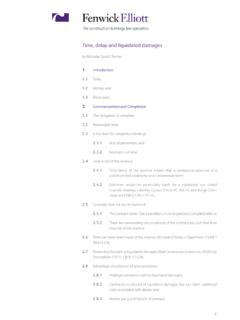Transcription of Bonds, Warranties and Guarantees - Fenwick Elliott
1 Bonds, Warranties and GuaranteesIntroductionBonds, Warranties and Guarantees - what you really need to knowObviously a seminar on bonds, Warranties and Guarantees could be a fairly 1. lengthy one and if pressed could probably take up the entire day. Fortunately, the title is limited to the bits we really need to know, thereby cutting out all those bits we don t need to thought the best approach would be to comment on the issues that crop 2. up most frequently. I will highlight:the basic legal principles underlying them (a refresher is always useful). what some of the key provisions mean and why they are needed. issues to consider when drafting and some of the common pitfalls. Bonds and guaranteesThe basic legal principlesI deal with these together on the basis that they are the two most 3.
2 Common forms of security taken by employers on construction projects and, from a legal point of view, have much in common. However, there is a great deal of misunderstanding about the legal principles underlying them which is not helped by the numerous names which are applied to bonds and Guarantees in the construction industry. These include: on-demand bonds, simple bonds, performance bonds, conditional-demand bonds, bank Guarantees , demand Guarantees , default bonds, performance Guarantees , surety bonds, surety Guarantees , parent company Guarantees . It is important to look beyond the names applied to these documents. The 4. label attached to a document is not conclusive as to the legal principles upon which it is Essentially the document should be based on one of two fundamentally different legal principles (but obviously the specifi c drafting means the position is often less clear than it could be and frequently results in a document falling somewhere in between these two principles).
3 Primary obligation. This is simply an undertaking from the bondsman (i) to pay a sum of money to the employer without reference to the liability of the It is this principle which underlies a true on-demand bond . These bonds are common on international projects but less so in the UK (except in the case of advance payment and retention bonds). I will refer to these as on-demand obligation ( guarantee ). This is where the bondsman s (ii) liability to pay the employer is contingent upon a breach by the contractor of the underlying construction contract. So if the employer cannot establish a breach by the contractor then the bondsman has no liability to pay. It is this principle that underlies the default bond , which is the more common form of bond used in UK projects. I will refer to this as a default bond but, as I have 1.
4 This was illustrated in Trafalgar House Construction (Regions) Ltd v General Surety v guarantee Co. Ltd [1995] 3 WLR 204; (1994) 66 BLR 42 where a document headed bond was fi rst treated as a traditional bond , then treated as the equivalent of a demand bond in the Court of Appeal and then fi nally found to be a guarantee by the House of Lords. 2. The terms employer , contractor and bonds-man are used in this paper, rather than the legal titles generally applied of benefi ciary/creditor, principal/debtor and Bebbpage 2 Bonds, Warranties and Guaranteesmentioned, they also have various other labels attached to is not always clear to distinguish whether a bond is truly on-demand or 5. whether it is conditional upon breach of the construction contract. Clever (or not so clever) drafting also sometimes means that bonds fall somewhere in between.
5 Some examples:In a true on-demand bond you would usually expect to fi nd wording along 6. the following lines:I promise to pay you X on receipt of your written request without proof or to this effect is unusual in bonds used in UK construction projects 7. and bonds tend to have conditions attached to them to limit a call. Unsurprisingly, these are known as conditional on-demand bonds. These conditions may include:a statement (usually from the architect/engineer) that the contractor is in default;enclosing copies of warning notices served on the contractor under the main contract;an adjudicator s award. These provisions should not detract from the bond being an on-demand 8. bond ; it simply places hurdles in the way of a claim. There is no suggestion that any default on the part of the contractor needs to be demonstrated - the conditions are simply administrative.
6 A true default bond would usually include wording such as:The Guarantor Guarantees to the Employer that in the event of a breach of the Contract by the Contractor the Guarantor shall discharge the damages sustained by the Employer as established and ascertained pursuant to and in accordance with the Building confusion that can arise where bonds sit somewhere in between true 9. on-demand and default bonds has been considered most recently in the Australian case of Clough Engineering Limited v Oil and Natural Gas Corporation Clough was an engineering company engaged by ONGC in relation to the development of oil and gas fi elds off the coast of India. Various disputes arose which culminated in ONGC terminating the contract and making a call on the bond . The wording in the construction contract between Clough and ONGC provided that Clough was to provide an unconditional and irrevocable bond and ONGC would have the right to claim an amount up to 10% of the value of the contract in the event of the Contractor failing to honour any of the commitments entered into under this contract.
7 The wording of the bond itself provided for the bank to pay immediately 10. on fi rst demand: on breach of contract by the Contractor without any demur, reservation, contest or protest or without reference to the Contractor. Clough maintained that the wording in the contract prevented a demand 11. being made and that ONGC had to prove breach on the part of Clough before a claim could be made on the bond . The Judge at fi rst instance rejected this and held that it was suffi cient for ONGC to call the bond where it had a bona fi de belief that Clough was in breach. When both the contract and the bond were considered together it was clear that a claimed breach of contract was suffi cient to trigger payment under the 3. [2008] FCA FC 136 (22 July 2008) 3 Bonds, Warranties and of the Statute of Frauds 16775.
8 Actionstrength Ltd (trading as Vital Resources) v International Glass Engineering Spa and others [2003] BLR 2076. This rule was established in the case of Holme v Brunskill (1878) 3 QBD 495 in which it was said that if there is any alteration to the terms of the guaranteed contract, the surety ought to be consulted and his consent sought. If the surety does not consent then the surety is in cases where it is self-evident that the alteration is unsubstantial or must be benefi cial to the surety . The rule in Holme v Brunskill was considered more recently in Mercers Co v New Hampshire Insurance [1992] 1 WLR, Lord Justice Scott, obiter of the rule Mr Beloff invites us to adopt the approach of certain United States authorities and to hold that, where the surety is a professional com-pensated surety, the discharge of the surety brought about by a variation of the principal contract should be pro tanto an not absolute.
9 I was impressed by the common sense approach of this transatlantic solution and by the undesirable rigidity of the rule in Holme v Brunskill in its application to compensated sureties. I was not convinced that binding authority stands in the way of the adoption of the adoption of this sensible solution in this country, but it is not necessary for us to decide the point in the present case . This is clear support, albeit obiter, for a more common sense to the release of compensated sureties (by which it is meant those companies who provide bonds for a fee) rather than strict application of the rule in Holme v Brunskill. bond . This decision was upheld on are other key points which distinguish on-demand bonds from 12. default guarantee , which is the legal basis of true default bonds, is similar to a 13.
10 Simple contract in that all the requirements for a contract must be present, such as an intention to create legal relations, consideration, etc. In addition to this, a guarantee must be in writing to be In the Actionstrength case5 a subcontractor sought payment directly from the employer where the main contractor had become insolvent. The subcontractor s claim was on the basis that the employer had said that the subcontractor should carry on working and that the employer would ensure that he got paid. The sub-contractor s claim failed on the basis that the apparent guarantee by the employer in respect of the main contractor s payment obligations had not been recorded in writing and so could not constitute a guarantee . This case is obviously a warning to contractors and subcontractors who proceed on the strength of a verbal assurance from a third party that they will be paid.

















